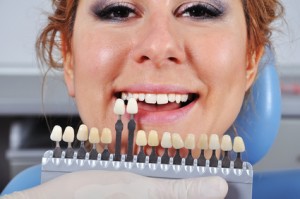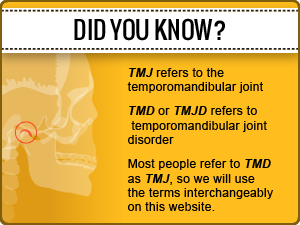Medication for TMJ
Learn more about how to get relief from TMJ Pain & DiscomfortWhat’s the Best Medication for TMJ Treatment?
 Many people who have been diagnosed with TMJ will take medication in order to help them better deal with their discomfort and/or pain. This can be in a prescription form that they’ve received from their doctor or it can be pain medication purchased over the counter. Because there can be many side effects to taking pain medication, it’s always a good idea to try and effectively treat the problem instead. In simple terms, TMJ is a misaligned bite that needs to be corrected. Once this misalignment is corrected, there should no longer be a need to take any medication.
Many people who have been diagnosed with TMJ will take medication in order to help them better deal with their discomfort and/or pain. This can be in a prescription form that they’ve received from their doctor or it can be pain medication purchased over the counter. Because there can be many side effects to taking pain medication, it’s always a good idea to try and effectively treat the problem instead. In simple terms, TMJ is a misaligned bite that needs to be corrected. Once this misalignment is corrected, there should no longer be a need to take any medication.
The best medication to treat TMJ is going to depend on you and your particular situation. Because there are varying degrees of discomfort and/or pain felt by those suffering from TMJ symptoms, medication options include acetaminophen, anti-inflammatory drugs (nsaids like aspirin or advil), muscle relaxants, anti-depressants, corticosteroids, and even narcotic painkillers. Although these medications may work temporarily to help soothe your pain, it’s only temporary making it important to understand that there is a need to actually correct the problem vs. continuing to take medication to hide the pain. Using narcotic drugs can actually increase your future levels of pain.
Do I have TMJ Disorder?
Symptoms include migraines, neck pain, jaw pain, lower back pain, snoring, sleep apnea. Use our Free TMJ Disorder Assessment ToolsWhy Medication for TMJ May Not Be Best
Medications are usually used to help manage pain. Although taking medications can help to relieve any ongoing pain and discomfort, they aren’t going to fix the problem. Receiving a TMJ diagnosis means that your jaw is not aligned correctly. This misalignment is going to affect the way you bite down, and the resulting pressure and strain on the jaw joint and surrounding muscles can lead to jaw pain, neck pain, back pain, headaches and even severe migraines.
A Better Option…
 Because TMJ pain is difficult to live with, it’s a good idea for you to fully understand all of your options. Dental treatments, starting with a physiologic diagnostic and progressing to a long-term orthotic after successful pain relief and healing. In addition to long-term orthotics orthodontics and/ or a full mouth reconstruction, are available for long term stabilization after pain relief has been accomplished. An orthotic that’s been made specifically to help you, which is made up of a nearly invisible dental piece that fits over your teeth and helps to reposition your jaw to a comfortable position where healing of hard and soft tissues occur. . A full mouth reconstruction involves the use of treatments such as veneers, implants, and crowns to reshape your teeth so that they mesh together correctly. Reconstruction is only considered after your jaw is comfortably in a new position from the diagnostic orthotic and has relieved all or almost all of your symptoms.
Because TMJ pain is difficult to live with, it’s a good idea for you to fully understand all of your options. Dental treatments, starting with a physiologic diagnostic and progressing to a long-term orthotic after successful pain relief and healing. In addition to long-term orthotics orthodontics and/ or a full mouth reconstruction, are available for long term stabilization after pain relief has been accomplished. An orthotic that’s been made specifically to help you, which is made up of a nearly invisible dental piece that fits over your teeth and helps to reposition your jaw to a comfortable position where healing of hard and soft tissues occur. . A full mouth reconstruction involves the use of treatments such as veneers, implants, and crowns to reshape your teeth so that they mesh together correctly. Reconstruction is only considered after your jaw is comfortably in a new position from the diagnostic orthotic and has relieved all or almost all of your symptoms.
Could Dental Treatments Work for You?
In order to understand if dental treatments could work for you, you’re going to need to have a complete evaluation performed first. It’s necessary to find out if the problem is indeed related to TMJ, we can then work together to choose the best remedy solution for you.


Hi guys seeing an Oral facial Specalist here in Dublin, Ireland, seeing them years and no help what so ever. I suffer from TMJ, jaw pain, neck pain, swollen glands and worst of all Dental and Ear aches. It’s never the teeth according to my Dentist. Can any one suggest anything else… i used all the medications avalible to me and they did not work, hot and cold press, anti inflamitory gels etc… including massage and alternative medicine, no help either, any one suggest anything else good? thanks
Unfortunately, many oral facial specialists totally don’t understand or utilize physiologic dentistry.
https://thinkbetterlife.com/referrals/
Ask your doctor about Sphenopalatine Gnglion Blocks, Occipital and/or Greater occipital nerve blocks, Trigger point injections, prolotherapy, spray and stretch and other techniques to reduce pain
Patient video testimonials: https://www.youtube.com/channel/UCk9Bfz6pklC7_UluWFHzLrg
I don’t know your issues but pain is usually easy to treat. Getting insurance companies to pay, that is hard.